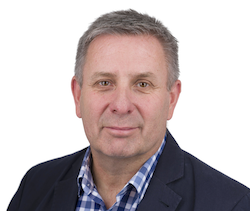 The priorities of business leaders and the general population are being pulled in uncertain directions right now but keeping Net Zero goals at the forefront of our minds at this challenging time remains an obligated and common sense imperative, according to industry experts leading last month’s Channel Forecast Insight Session.
The priorities of business leaders and the general population are being pulled in uncertain directions right now but keeping Net Zero goals at the forefront of our minds at this challenging time remains an obligated and common sense imperative, according to industry experts leading last month’s Channel Forecast Insight Session.
 Heightened awareness of climate change is key to the success of Net Zero endeavours, but given the cost of living plight, the uncertain economy, the effects of war in Ukraine and the ongoing energy cost crisis – are Net Zero considerations likely to remain top of mind or, relative to the pressing issues mentioned, be superseded in priority? According to Will Ennett (pictured left), Head of Sustainability, TalkTalk, pushing forward on the climate agenda can benefit the challenges we face, and sustainability will remain top of mind. “A key element is the interconnectedness of the climate crisis to many of the macro challenges we face in the world today,” he stated. “For example, most businesses now have a challenge in terms of energy prices.”
Heightened awareness of climate change is key to the success of Net Zero endeavours, but given the cost of living plight, the uncertain economy, the effects of war in Ukraine and the ongoing energy cost crisis – are Net Zero considerations likely to remain top of mind or, relative to the pressing issues mentioned, be superseded in priority? According to Will Ennett (pictured left), Head of Sustainability, TalkTalk, pushing forward on the climate agenda can benefit the challenges we face, and sustainability will remain top of mind. “A key element is the interconnectedness of the climate crisis to many of the macro challenges we face in the world today,” he stated. “For example, most businesses now have a challenge in terms of energy prices.”
 Paul Harrison (pictured), EMEA Managing Director, Evolve IP, said his Net Zero objectives are clear: “We’re going to be independent from energy companies and the global issues that affect energy prices. We’ll be better off in the long run, but in the short-term how do we manage those costs and make it predictable for customers and employees to ensure they can battle through this? We want to show them that it’s present in our mind too as a business.”
Paul Harrison (pictured), EMEA Managing Director, Evolve IP, said his Net Zero objectives are clear: “We’re going to be independent from energy companies and the global issues that affect energy prices. We’ll be better off in the long run, but in the short-term how do we manage those costs and make it predictable for customers and employees to ensure they can battle through this? We want to show them that it’s present in our mind too as a business.”
Every business faces the challenge of BAU and short-term targets, while sustainability and Net Zero can be more longer-term, noted Ennett. “But regulation is coming,” he added. “Next year all plc companies have to work towards Treasury mandated reporting requirements for climate risks, strategy and reporting emissions (TCFD). Also coming down the track is IFRS in the finance world which will integrate sustainability reporting. That’s keeping Net Zero front of mind. And a number of our largest partners have asked us for information on what we are doing about emission reduction.”
Against this backdrop, measuring sustainability based on key benchmarks is key to success, noted Ennett. “We have been calculating and reducing scope 1 and 2 emissions for ten years, principally electricity usage in our data centres,” he added. “The challenge now becomes scope 3, those areas outside our direct control. For every telecoms company and reseller the supply chain will be the largest source of emissions. This has allowed me to focus on our business-wide strategy. Our supply chain is dominated by larger companies with resources to measure their footprint, but in the long-term some SMEs in our supply chain will struggle. We ran SME webinars during the summer on starting the Net Zero journey.”
Another barrier to carbon reduction success is staff buy-in, observed Harrison. “Trying to get the whole company involved on the journey is a challenge,” he stated. “You can only do this if you have everyone signed up to making sustainability a priority. More widely, we need to evangelise what sustainability can do for a business. We’ve been learning a huge amount to understand the benefits and get those USPs across. The journey to becoming carbon neutral has been an education curve.”
The current crises impacting the world have not dinted the level of mindshare Harrison gives to green issues, and he continues to advance a strong case for keeping the sustainability conversation going in terms of technological benefits to businesses. “Hosted comms means using less power, making businesses more energy efficient,” he added. “For example, we can generate a report for a PBX system in seconds that details its power consumption in terms of the handsets etc and what the carbon offset would be to remove the PBX.
“Once you start talking about this to partners it opens their eyes and shows a massive saving on that journey to carbon neutral. This is something different to talk about and is a definite USP. Customers want to go on that journey too – and they don’t want unknown costs. Knowing they are playing a part in carbon reduction is key.”
Harrison also noted that the majority of UK customers are using standard voice. “They don’t collaborate but they will start to move that way, work more efficiently and take less journeys,” he commented. “We’ve been through Covid and many more people are working from home, so we are looking at all aspects of that in terms of moving from an office-based workforce to a hybrid model with cloud-first and hosted telephony. We’re working with partners to bring them on that journey.”
Harrison pointed to Evolve IP’s strong play in the hospitality sector to further demonstrate the benefits of energy management. “We work with hotels that may be suffering from low occupancy rates,” he explained. “If a room is not occupied we can turn the power and phone off in that room, and take this to other verticals like education where facilities may not be used all of the time.”
According to Ennett, another technological upside is the roll out of full fibre. “This should yield significant benefits,” he added. “We conducted a study that found fibre to be approximately 80 per cent more energy efficient than traditional copper. This won’t happen overnight but we are confident about the trajectory.”
TalkTalk is launching its Future Fibre Fund to help small businesses in Greater Manchester become more sustainable. Businesses can apply for grants to help them transition to low carbon technology, along with part investing in solar panels and energy efficient devices. “As part of that we’ll offer training on how to start to measure carbon footprints,” noted Ennett. “It’s about mixing up the longer-term goals which may be hard to visualise with some of those real visual aspects that show you’re making progress on the journey.”
Consolidation factors
We have noted that carbon reduction success hinges on interconnected action within the supply chain. It also relies on the interconnectedness of acquired companies and their consolidation, observed Harrison. “We are making acquisitions to grow the company so consolidation and global alignment reduces the number of data centres,” he said. “Consolidating data centres is not an easy task. We’ll likely go from 14 to six and still be compliant within regions around security elements for example. Scope 3 is where we want to get to. The quick wins for us are consolidation and talking about what the technology can do to improve more collaborative working. It’s all about an education.”
For its part TalkTalk has reduced the electricity consumption of its data centres and offices by about 15 per cent during the past three years. “That’s helping the bottom line and helping us reach climate change targets,” said Ennett. “We also signed up to the UN Race to Zero campaign committed to science based targets, which measures reductions in carbon footprint across all three scopes in absolute terms. This precipitated a big focus on scope 3 and in particular our supply chain, working with partners and creating procurement policies around what we expect from partners in terms of emissions reporting.”
To those business leaders not yet motivated by the greater good, Ennett reiterated that there are also hard nosed business reasons to start thinking about a Net Zero strategy. “There is regulation with us today and coming down the track,” he stated. “Investors are asking questions, and if customers aren’t asking you now, they will be. So getting involved makes good business sense.”
